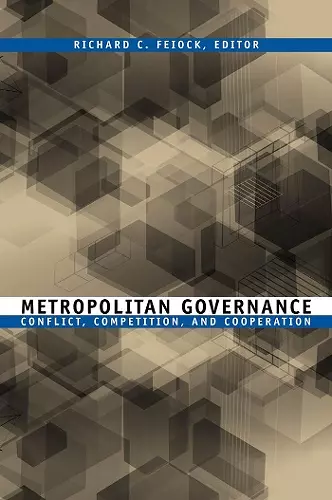Metropolitan Governance
Conflict, Competition, and Cooperation
Richard C Feiock author Richard C Feiock editor
Format:Paperback
Publisher:Georgetown University Press
Published:23rd Aug '04
Currently unavailable, and unfortunately no date known when it will be back

What should we do about important public policy problems, from transportation to economic growth, that no longer fit the boundaries of our local governments? In this important new book, Feiock and his colleagues examine the role that area-wide strategies for governance can play. They look at the potential, through cooperation, and some of the problems, the competition. The result is an unusually thoughtful look at one of the most important issues of American politics. -- Donald F. Kettl, professor of public affairs and political science, University of Wisconsin-Madison
Provides insight into the central role that municipal governments play in the governance of metropolitan areas. This title explores the theory of institutional collective action through empirical studies of land use decisions, economic development, regional partnerships, school choice, morality issues, and boundary change."Metropolitan Governance" is the first book to bring together competing perspectives on the question and consequences of centralized vs. decentralized regional government. Presenting original contributions by some of the most notable names in the field of urban politics, this volume examines the organization of governments in metropolitan areas, and how that has an effect on both politics and policy. Existing work on metropolitan governments debates the consequences of interjurisdictional competition, but neglects the role of cooperation in a decentralized system. Feiock and his contributors provide evidence that local governments successfully cooperate through a web of voluntary agreements and associations, and through collective choices of citizens. This kind of "institutional collective action" is the glue that holds institutionally fragmented communities together. The theory of institutional collective action developed here illustrates the dynamics of decentralized governance and identifies the various ways governments cooperate and compete. "Metropolitan Governance" provides insight into the central role that municipal governments play in the governance of metropolitan areas. It explores the theory of institutional collective action through empirical studies of land use decisions, economic development, regional partnerships, school choice, morality issues, and boundary change - among other issues. A one-of-a-kind, comprehensive analytical inquiry invaluable for students of political science, urban and regional planning, and public administration - as well as for scholars of urban affairs and urban politics and policymakers - "Metropolitan Governance" blazes new territory in the urban landscape.
ISBN: 9781589010208
Dimensions: unknown
Weight: 408g
272 pages